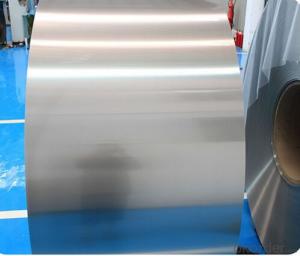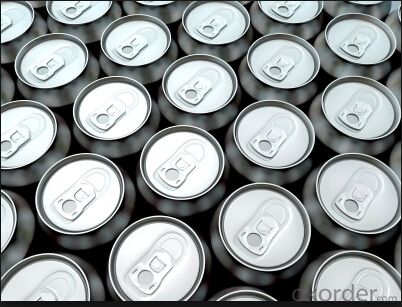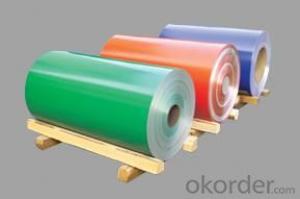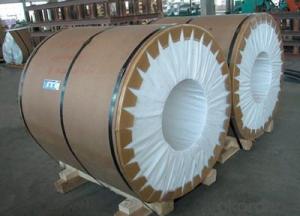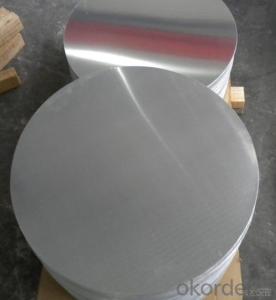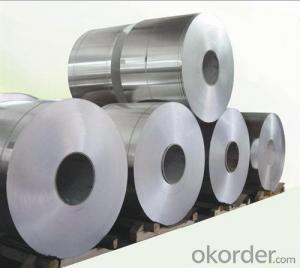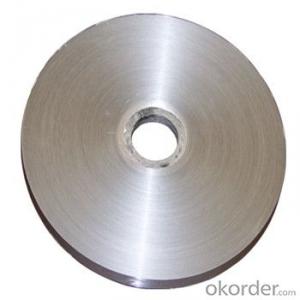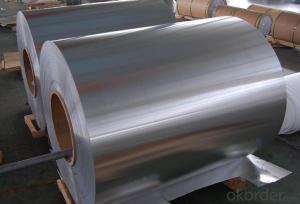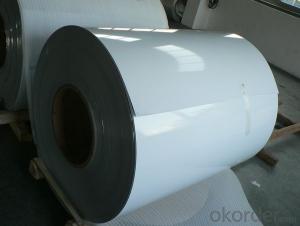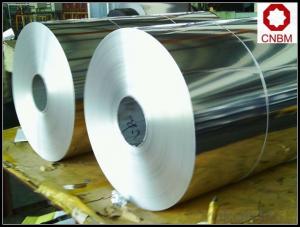Brown Aluminum Coil Stock for Cap Stock Production
- Loading Port:
- Shanghai
- Payment Terms:
- TT OR LC
- Min Order Qty:
- 20 m.t.
- Supply Capability:
- 100000 m.t./month
OKorder Service Pledge
OKorder Financial Service
You Might Also Like
1.Structure of 5182 Aluminum Coil Description:
5182 Aluminium coil can be used for aluminum can which is a container for packaging made primarily of aluminum (BrE aluminium).It is commonly used for foods and beverages but also for products such as oil, chemicals, and
other liquids.Most aluminum cans are made of two pieces. The bottom and body are "drawn" or "drawn and ironed" from a flat plate or shallow cup. After filling, the can "end" is sealed onto the top of the can. Aluminum cans are often made with recycled aluminum; approximately 68% of a standard North
American can is recycled aluminum.
2.Main Features of the 5182 Aluminum Coil:
1)light weight
2)easily and economically recycled
3)superior barrier qualities
4)good formability
3.5182 Aluminum Coil Image:
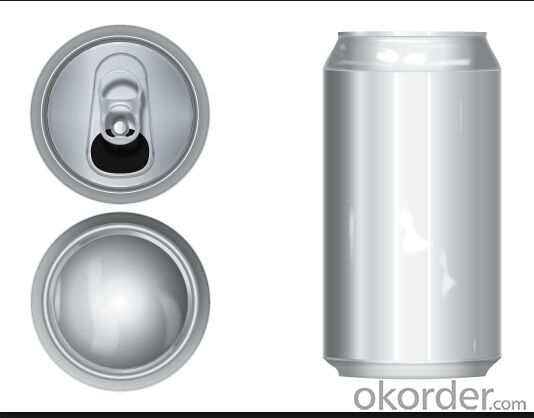
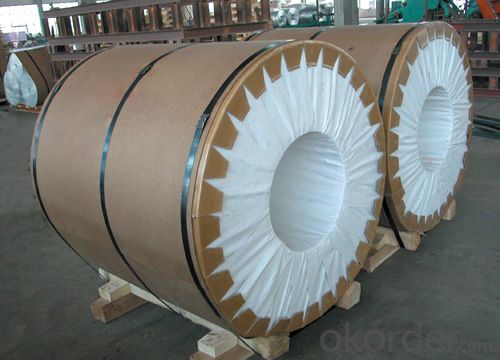
4.5182 Aluminum Coil Specification:
Alloy | Temper | Thickness | Width | Prepainting |
A5052,A5182 | H19,H18,H16(H49,H48,H46) | 0.23~0.60mm | <1550mm< span=""> | EPOXY, PPG |
Inner Diameter | Outside Diameter | MOQ | Application | Coil Weight |
405,505,605mm | <1500mm< span=""> | 10 MT | Can Cover/Tab | <5 |
5.FAQ:
1) How about your quality?
Quality is priority! Every worker keeps the QC from the very beginning to the very end, Quality control department especially responsible for quality checking in each process.
2) How about the delievery time?
About 30-45 days
3) What is your payment terms?
TT or LC
- Q: Guangdong where there are professional to do around the paper corner, is packing steel coil, aluminium coil that protect the edge of the both ends of the cylinder. Just the kind of picture.
- Guangdong Province, professional Foshan recommended edgeboard around Foshan Ansheng packaging. They are very professional in their circle, L shaped, and curved corners.
- Q: Can aluminum coils be fabricated or formed into different shapes?
- Aluminum coils possess the capability to be transformed into diverse forms through fabrication or shaping. Thanks to its malleability, aluminum can be effortlessly manipulated and molded without any fear of cracking or rupturing. Various techniques including bending, rolling, and stamping can be employed to alter the shape and design of the coils. Consequently, these coils can be subsequently processed or joined together to manufacture products with distinct geometries, such as automotive parts, kitchenware, electrical elements, or even architectural edifices. The pliability of aluminum as a material opens up a broad spectrum of possibilities in terms of configuring and giving it different structures.
- Q: This question seeks to understand the various types of aluminum coils that are commonly found in the market.
- <p>Aluminum coils available on the market today can be categorized based on their properties and applications. These include: 1. Plain Aluminum Coils: Used for general purposes like packaging and construction. 2. Embossed Aluminum Coils: Feature a textured surface, used in decorative applications. 3. Alloy Aluminum Coils: Made from a mixture of aluminum and other metals for enhanced strength or corrosion resistance. 4. Color Coated Aluminum Coils: Coated with paint or plastic for aesthetic or protective purposes. 5. Heat Treated Aluminum Coils: Processed to improve their mechanical properties. 6. Mirror Finish Aluminum Coils: Have a highly reflective, polished surface. 7. Pre-painted Aluminum Coils: Coated with a layer of paint before being used in construction or other applications. Each type serves specific industries and applications, with variations in thickness, width, and alloy composition.</p>
- Q: Can aluminum coils be used in refrigeration systems?
- Yes, aluminum coils can be used in refrigeration systems. Aluminum is a popular choice for coil materials in refrigeration systems due to its excellent heat transfer properties and corrosion resistance. Aluminum coils are lightweight, durable, and efficient in transferring heat, making them suitable for use in various refrigeration applications such as air conditioning units, refrigerators, and freezers. Additionally, aluminum coils are easier to shape and install compared to other materials, making them a preferred choice for manufacturers.
- Q: Can aluminum coils be used in vacuum applications?
- Yes, aluminum coils can be used in vacuum applications. Aluminum is a commonly used material in vacuum systems due to its excellent properties such as low outgassing, high thermal conductivity, and good corrosion resistance. These properties make aluminum coils suitable for various vacuum applications, including but not limited to, vacuum chambers, vacuum pumps, cryogenic systems, and particle accelerators. However, it is important to note that aluminum can be reactive with certain gases or chemicals, so it is essential to consider the specific requirements and compatibility of the vacuum application before using aluminum coils.
- Q: What is the typical yield strength of aluminum coils?
- The typical yield strength of aluminum coils can vary depending on the specific alloy and temper, but it generally ranges from 15,000 to 35,000 pounds per square inch (psi).
- Q: How do aluminum coils contribute to sustainable manufacturing?
- Aluminum coils contribute significantly to sustainable manufacturing in various ways. Firstly, aluminum is a highly recyclable material, and the use of aluminum coils promotes a closed-loop recycling system. These coils can be easily melted down and reused without losing their original properties, reducing the need for new raw materials and minimizing the environmental impact of mining and extraction. Additionally, aluminum coils are lightweight, which reduces energy consumption during transportation. Their lightweight nature makes them more fuel-efficient to transport, resulting in lower greenhouse gas emissions. This not only reduces the carbon footprint but also saves costs associated with transportation. Moreover, aluminum has excellent corrosion resistance properties, which makes it durable and long-lasting. This durability reduces the need for frequent replacements, leading to less waste generation. It also extends the lifespan of products that use aluminum coils, reducing overall resource consumption and minimizing environmental strain. Furthermore, the use of aluminum coils in manufacturing processes promotes energy efficiency. Aluminum has high thermal conductivity, meaning it can efficiently transfer and dissipate heat, resulting in reduced energy consumption during various manufacturing operations. This energy efficiency translates into lower energy costs and reduced greenhouse gas emissions. Lastly, aluminum is non-toxic and does not release harmful substances during its lifecycle. This ensures the safety of workers, consumers, and the environment. The absence of toxic materials also simplifies the recycling process, making it easier and more environmentally friendly. In conclusion, aluminum coils contribute to sustainable manufacturing through their recyclability, lightweight nature, durability, energy efficiency, and non-toxic properties. By incorporating aluminum coils into manufacturing processes, companies can reduce their environmental impact, conserve resources, and promote a more sustainable future.
- Q: The choice between Vinyl and Aluminum? By Mastercraft Exteriors
- The choice between Vinyl and Aluminum? It is a common question that we hear from our clients, “Which is better, aluminum or vinyl?” Although aluminum siding was traditionally thought to be more durable, today’s vinyl products are far superior. The remodeling panels used in today’s siding markets are on average double the thickness of the aluminum. Most vinyl siding panels have fade warranties, high wind and tensile strength guarantees and insulate the home from both temperature variances and noise. Aluminum siding is also painted for appearance which can scratch easily showing the metallic underside. This is far different from vinyl, where the manufacturing process includes “through color” consistency. Vinyl siding can be ordered in traditional Straightlap and Dutchlap of all sizes, simulated cedar shake and scallop panels, and board batten. In most cases during insurance claim remodeling an upgraded vinyl panel can be substituted for the amount allotted for the aluminum siding. Another reason Mastercraft Exteriors supports the use of vinyl panels during the remodeling process, is its ability to be serviced. If a dent occurs in aluminum siding the surrounding panels must also be replaced to fix that one dent. Vinyl siding can be easily switched out in a matter of minutes, keeping the cost down to the client. Mastercraft Exteriors
- Q: This question asks for a method to calculate the diameter of an aluminum coil using its weight and density.
- <p>To calculate the diameter of an aluminum coil based on its weight and density, you first need to know the volume of the coil. The formula for volume (V) is V = mass (m) / density (蟻). Once you have the volume, you can use the formula for the volume of a cylinder, V = 蟺r虏h, where r is the radius and h is the height (or length) of the coil. If you know the height of the coil, you can solve for the radius and then double it to find the diameter (D = 2r). Ensure you have consistent units for all measurements. This calculation assumes the coil is cylindrical and uniform in thickness.</p>
- Q: How do aluminum coils compare to plastic coils in terms of durability?
- Aluminum coils generally offer superior durability compared to plastic coils. Aluminum is a highly durable material known for its strength and resistance to wear and tear. It can withstand heavy usage and is less likely to crack, break, or deform under pressure. On the other hand, plastic coils may be more prone to damage, especially when subjected to repetitive use or extreme temperatures. While plastic coils can be cost-effective and lightweight, they may not hold up as well over time. Therefore, if durability is a priority, aluminum coils are a better choice as they offer a longer lifespan and greater resistance to damage.
Send your message to us
Brown Aluminum Coil Stock for Cap Stock Production
- Loading Port:
- Shanghai
- Payment Terms:
- TT OR LC
- Min Order Qty:
- 20 m.t.
- Supply Capability:
- 100000 m.t./month
OKorder Service Pledge
OKorder Financial Service
Similar products
Hot products
Hot Searches
Related keywords
